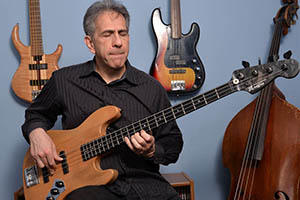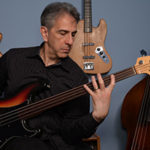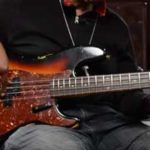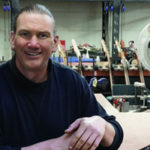Living in a world with those “closed-minded purists”
By Jon Liebman
Week of January 20, 2020
A few weeks ago, I wrote about how certain people don’t believe the electric bass is an acceptable instrument for playing jazz, particularly when it comes to playing walking bass lines. But the argument goes even deeper. In fact, there are individuals who flat-out refuse to acknowledge the electric bass as a legitimate musical instrument altogether.
I touched on the topic in this week’s interview with Jason Heath, a prolific podcaster and self-proclaimed bass nerd, whose focus happens to be primarily on the upright bass. I asked Jason if he’d encountered this “purist snobbery” among acoustic bass players with whom he’s come in contact.
I’d set up the question, first by telling Jason about my experience interviewing world-renowned double bass virtuoso soloist Gary Karr. Aside from being incredibly friendly and open, I was impressed – and admittedly, a bit surprised – when Gary began expressing his appreciation for people like Victor Wooten, Michael Manring, Jaco Pastorius and other world-class electric bass players. Not a hint of snobbery in his voice!
I also shared another story with Jason about how I’d been in a jazz club many years ago, and was having a conversation with the drummer. We were getting on pretty well, talking about jazz, our favorite players, classic recordings, and such. Then one point, I happened mentioned to that I play electric bass too. “Not with me you don’t,” he barked. “I hate that thing!” The snobbery and disdain was palpable.
Fortunately, Jason says he’s never come across anything like that. In fact, most of the attitudes he’s seen regarding the electric bass were of downright bafflement at the feats that can be accomplished on the electric bass, far removed from anything these dyed-in-the-wool classical double bassists had ever seen. In most cases, I’m happy to convey, they were duly impressed.
If some people don’t like the electric bass, or if they prefer the upright bass over the electric, I can respect that. Looking down their noses at others, however, because they think they’re right and the others are wrong… well, that’s their issue, not ours.
Have a thought on the subject? Leave a comment below and let me know what you think. In the meantime, check out my interview with Jason here.





In my experience, a large percentage of the time, those prejudices against electric bass were founded on experience. Way too many electric bassists have not honored the “tradition” of how to play jazz in a “traditional” environment. Note choice, tone, and rhythmic devices are usual culprits.
I did experience it in college, by some up and coming “jazz snobs”…. but most of them have gone on to play very high profile rock and pop gigs. 😉
But, my overall experience when someone states a disdain for electric bass, it is because of musical trauma inflicted on them by an electric bassist.
We should all listen more to the masters and try to emulate their Time, Tone, and Feel. Also, it is of great value as an electric bassist to become familiar with the double bass, at least being able to play it some. I have seen this help many electric bassists improve their musical voice.
I find that if there is “any” snobbery toward the electric OR upright defines lack of growth, IMO. I was taught to be acceptable to all types of basses. I never looked down on the upright; just realized you can’t APPROACHED it like an electric. Total different beast. I have an NED wave electric upright bass with a bow and I realized wow; night & day. I had to change my view on ‘synth’ bass. At one point I ‘hated’ synth bass with a passion. During the 80’s that freaking DX7 bass patch was killing us bass players. My teacher forced me to learned it and it accomplishes 2 things. 1) made me learn how to play keyboards and how chords work with the bass; 2) help me to get more gigs. Then he told about how it’s important to learn electric & upright bass for MUSICAL GROWTH. I get ticked off when I hear bass players (so call ‘purist’) say electric bass ain’t a REAL bass or upright bass is for old guys. Really? Old guys? I guess Christian McBride must be old and i’m 15 yrs ‘older’ than him. It’s all music. Electric, upright, synth, they’re all TOOLS. And we should (just as I learned) to embraced it all.????????????
Maybe some of those ‘purist’ upright bassists lash out because they (conciously or sub) feel threatened by the far wider *variety* of tones and playing ‘feels’ achievable on electric basses.
I had a teacher at El Camino Community College who just about crushed me with this type of snobbery. I was 22 years old and I had just performed Jaco’s “Continuum”, Victor’s harmonic version of “Amazing Grace” and an original solo piece in front of a class of 150 people. I was so nervous! When I finished, she stood up and said, “Wow, I am surprised you take yourself so seriously considering the fact that you don’t play a real instrument.” I was blown away and, of course, hurt. Real instrument?!! How could anyone talk this way about electric bass? And how could a teacher be so discouraging? It took a minute, but I got over it. She was quite a bit older and, while age doesn’t excuse her prejudice or hurtful comments, it might explain where she was coming from.
Angeline, as the current electric AND upright bass teacher at El Camino, I’m sorry I wasn’t teaching there at that time. Her comment was inexcusable, regardless of her age. I’m glad to hear that none of this affected you and your successful career.
Nobody has mentioned this CRAZY idea that there are such things as “fake” or “not real” musical instruments. If you can make music with it, then it has to be “real,” even if it exists only in virtual reality (or Karma mode). Music is real, even when you make it with a Kazoo. Music may be in the ear of the beholder, but musical instruments are not. you might play a Playskool tin and plastic xylophone (with wheels and tow string), or a Strad. Music comes out of both of them. If someone doesn’t get the musical genius of Jaco’s Continuum, because they dislike the tool he used to make it, then take some time and open your ears. If you have different taste, cool, but you can’t say it isn’t musical.
I think that Geoff may have a good point. People fear change and the electric bass (EB) is probably something that pulls music in a direction that they don’t like.
What I find odd is that the EB has been around for so long now it has as much tradition as should be needed.
For myself, being a 5 string active bass player who is dabbling with a 6 occasionally, and really enjoy the tone of certain amps, I wouldn’t have as much fun on anything else but an EB. But, too the point, that is just me.
The disdain for the electric bass is the biggest and most inexcusable double standard in music. That is because the electric guitar has been widely accepted and embraced as a legitimate jazz instrument.
You can’t put Wes Montgomery and Monk Montgomery on the same bandstand and say that one is legit and the other isn’t. It’s utter nonsense.
The other part of the issue is that guitarists never had to endure immediate and ongoing contempt the way electric bassists have. Charlie Christian was hailed virtually as soon as he plugged in. The electric guitar was validated almost from the get go.
There was a brief period in the 1970’s when the electric bass was gaining acceptance and wider use in jazz, partly out of necessity. The music was getting louder, but pickups and amplification for the upright were still in their infancy, and the instrument couldn’t be heard on stage. Early pickups sounded awful. Great players like Richard Davis were using unbuffered piezo rigs and producing a thin, scratchy, trebly sound. The only good thing about the sound was that it was audible. Eventually, amplification became more effective and the rise of the neoclassic school and the emergence of the jazz police put an end to any growing generosity of spirit in regard to the electric bass.
Creativity and musicality exist wherever they are found, regardless of context. If you listen to Rich Brown, Dario Deidda, or Jeff Andrews, you are experiencing artistry that transcends the instrument.
I can’t ad to Mr. Hartmans point above – it’s spot on. I Played with a guitar player for bit that was fast & technically very good, but musically absent – no timing, rushed tones, no finesse, didn’t listen to the other band mates. I told him to take his car keys, go sit in the middle of a big field and shake them around until he found Music, then call me. I Play both upright and electric bass. In my the arsenal, I have a flat top acoustic bass guitar, fretless & fretted electric basses and the upright – all have their places and flavors to ad to the Music – which is what we play.
I have no proof, but I believe a large part of the snobbery originated from upright players who could not quickly master the new instrument. With exactly the same range, but a different technique required, I’m thinking jazz bassists found it easier to disdain the instrument than master it. We all should know the Lionel Hampton story, insisting Monk Montgomery get a Fender and play it in his big band. Bob Cranshaw comes to mind as a player who could walk masterfully on the bass guitar. I myself find it much harder to play rock or especially 8th note fusion on upright, than walking lines on a Fender. Tone starts in the mind, anyway, then is shaped by our fingers. A lot of jazz purity is bullshit anyway. I mean, Paul McCartney has more “wood” in his sound than Neils-Henning Orsted Petersen ever did. Listen to “All You Need is Love” with headphones before you laugh.